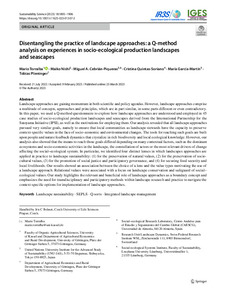| dc.date.accessioned | 2023-08-14T11:13:12Z | |
| dc.date.available | 2023-08-14T11:13:12Z | |
| dc.date.issued | 2023-03-23 | |
| dc.identifier | doi:10.17170/kobra-202308058581 | |
| dc.identifier.uri | http://hdl.handle.net/123456789/14984 | |
| dc.description.sponsorship | Gefördert im Rahmen des Projekts DEAL | ger |
| dc.language.iso | eng | eng |
| dc.rights | Namensnennung 4.0 International | * |
| dc.rights.uri | http://creativecommons.org/licenses/by/4.0/ | * |
| dc.subject | landscape sustainability | eng |
| dc.subject | SEPLS | eng |
| dc.subject | q-sorts | eng |
| dc.subject | integrated landscape management | eng |
| dc.subject.ddc | 500 | |
| dc.subject.ddc | 710 | |
| dc.title | Disentangling the practice of landscape approaches: a Q-method analysis on experiences in socio-ecological production landscapes and seascapes | eng |
| dc.type | Aufsatz | |
| dcterms.abstract | Landscape approaches are gaining momentum in both scientific and policy agendas. However, landscape approaches comprise a multitude of concepts, approaches and principles, which are in part similar, in some parts different or even contradictory. In this paper, we used a Q-method questionnaire to explore how landscape approaches are understood and employed in 45 case studies of socio-ecological production landscapes and seascapes derived from the International Partnership for the Satoyama Initiative (IPSI), as well as the motivations for employing them. Our analysis revealed that all landscape approaches pursued very similar goals, namely to ensure that local communities as landscape stewards have the capacity to preserve context-specific values in the face of socio-economic and environmental changes. The tools for reaching such goals are built upon people and nature feedback dynamics that crystalize in rich biodiversity and local ecological knowledge. However, our analysis also showed that the means to reach those goals differed depending on many contextual factors, such as the dominant ecosystems and socio-economic activities in the landscape, the constellation of actors or the most relevant drivers of change affecting the social–ecological system. In particular, we identified four distinct lenses in which landscapes approaches are applied in practice to landscape sustainability: (1) for the preservation of natural values, (2) for the preservation of socio-cultural values, (3) for the promotion of social justice and participatory governance, and (4) for securing food security and local livelihoods. Our results showed an association between the choice of a lens and the value types motivating the use of a landscape approach. Relational values were associated with a focus on landscape conservation and safeguard of social–ecological values. Our study highlights the relevant and beneficial role of landscape approaches as a boundary concept and emphasizes the need for transdisciplinary and participatory methods within landscape research and practice to navigate the context-specific options for implementation of landscape approaches. | eng |
| dcterms.accessRights | open access | |
| dcterms.creator | Torralba, Mario | |
| dcterms.creator | Nishi, Maiko | |
| dcterms.creator | Cebrán-Piqueras, Miguel A. | |
| dcterms.creator | Quintas-Soriano, Cristina | |
| dcterms.creator | García-Martin, María | |
| dcterms.creator | Plieninger, Tobias | |
| dc.relation.doi | doi:10.1007/s11625-023-01307-2 | |
| dc.subject.swd | Landschaft | ger |
| dc.subject.swd | Nachhaltigkeit | ger |
| dc.subject.swd | Landschaftsplanung | ger |
| dc.subject.swd | Q-Technik | ger |
| dc.subject.swd | Landschaftspflege | ger |
| dc.type.version | publishedVersion | |
| dcterms.source.identifier | eissn:1862-4057 | |
| dcterms.source.issue | Issue 4 | |
| dcterms.source.journal | Sustainability Science | eng |
| dcterms.source.pageinfo | 1893-1906 | |
| dcterms.source.volume | Volume 18 | |
| kup.iskup | false | |


